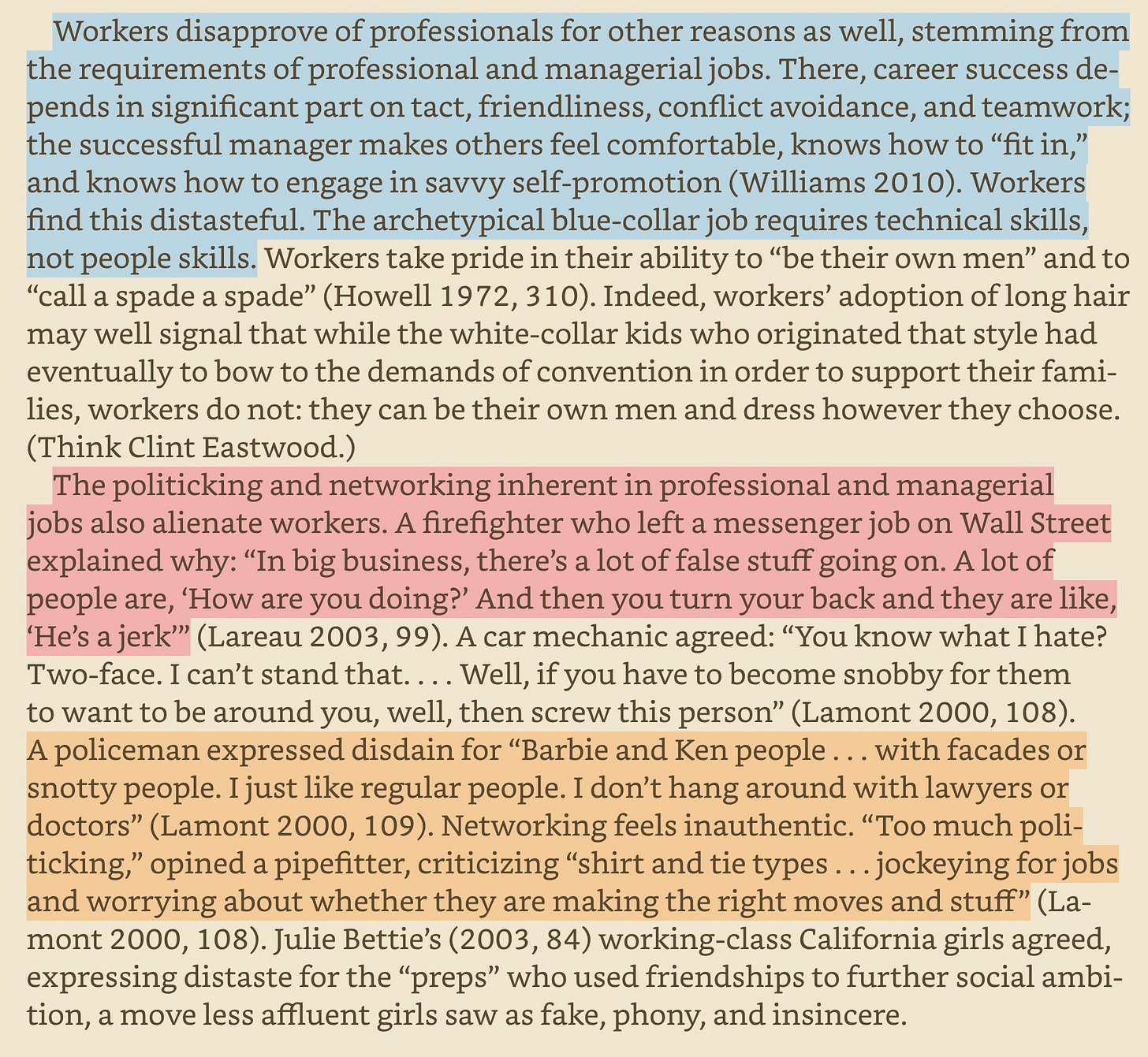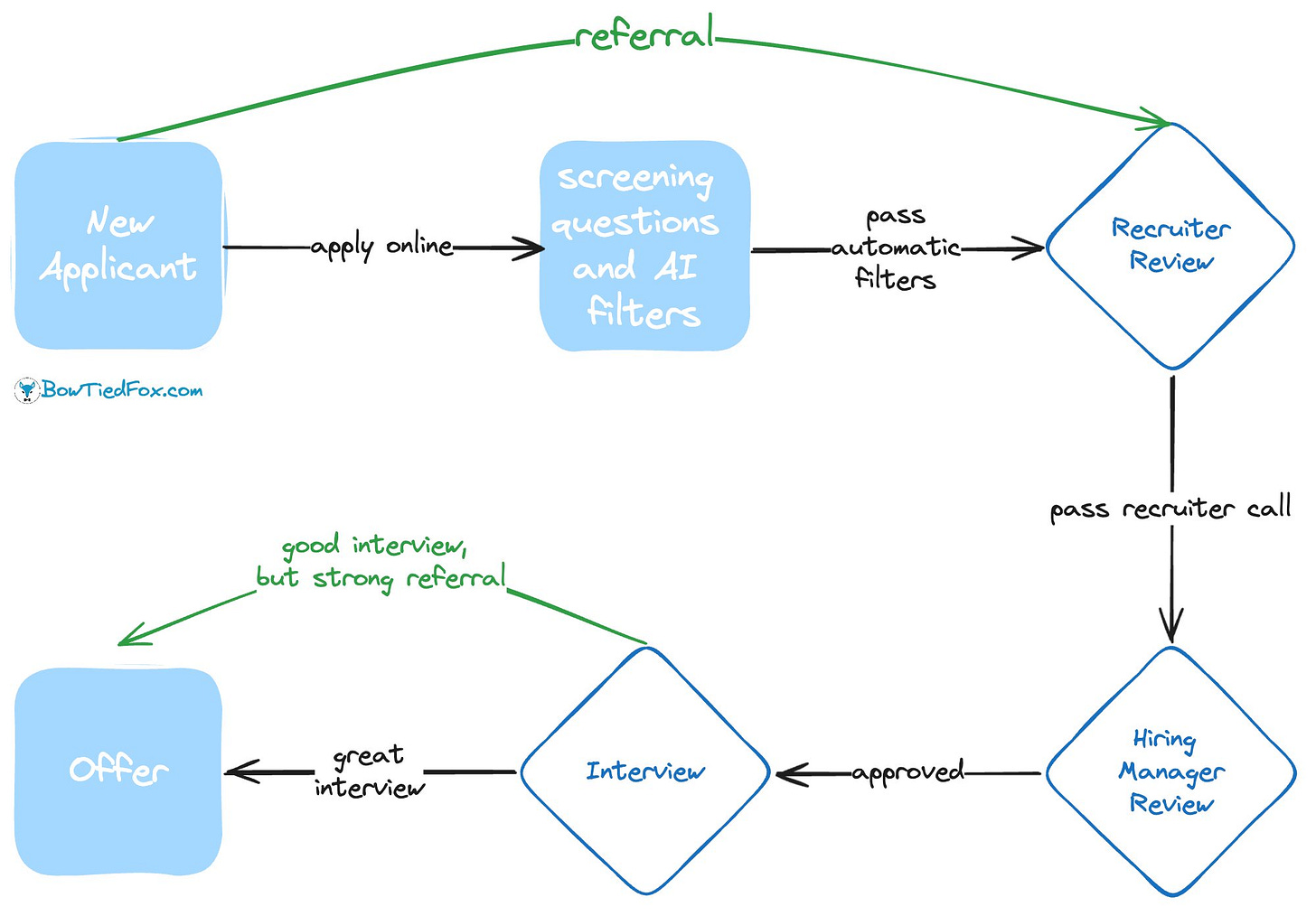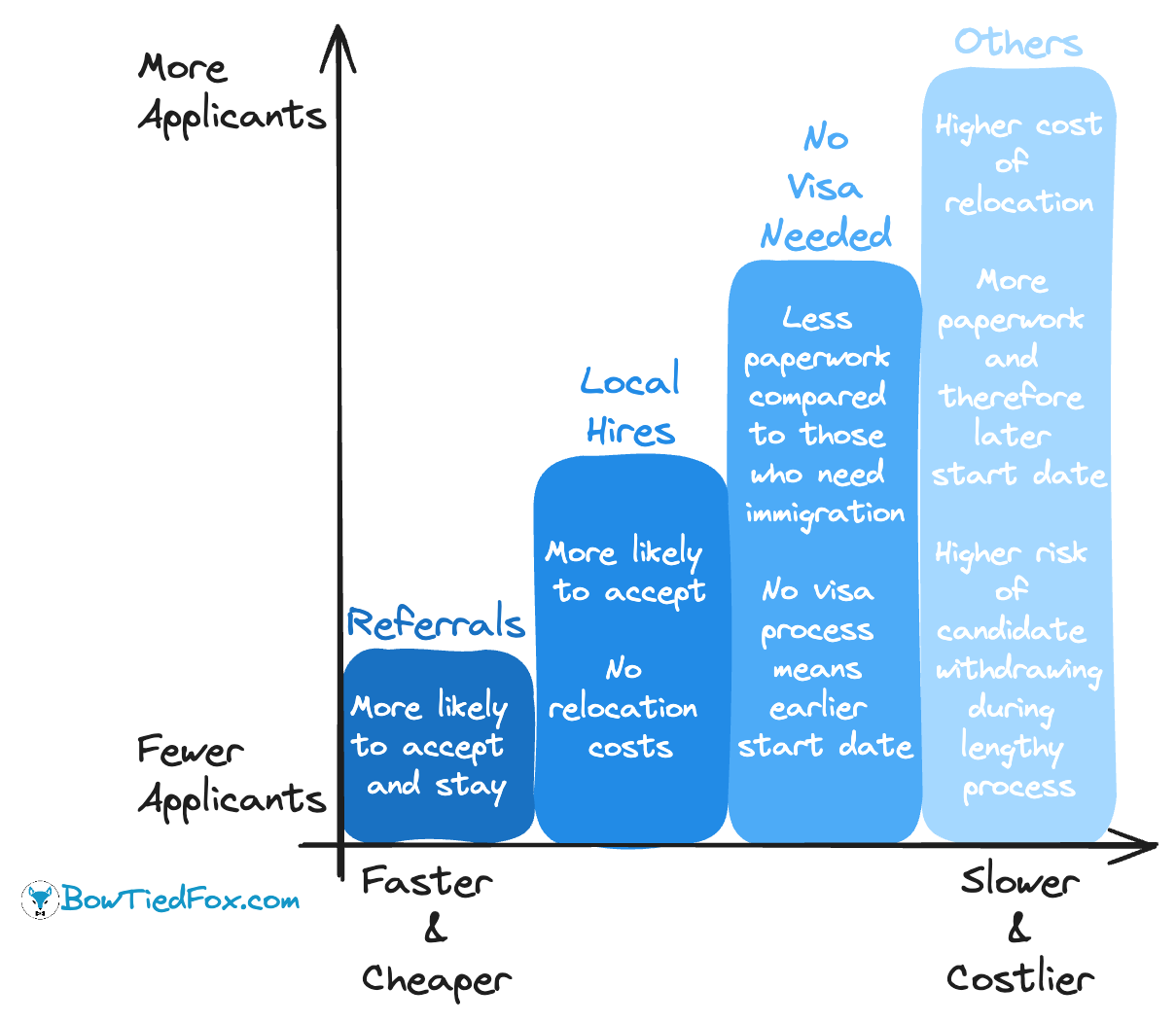Networking Optimization
This is a preview of one section in my upcoming career guide, which will be updated by the end of this month. Feedback and requests are welcome.
Table of Contents
Introduction
What is Networking?
How to Network
Who to Network With
Networking with Juniors
Networking with Seniors
Networking Mistakes
How to Hold a Conversation
1. Introduction
One of the reasons working class people resist upward social mobility is because they disapprove of the self-promotion and sly foxing required to advance to the world of the upper-middle class:
Networking is often misunderstood as being disingenuous. However, simply meeting people will not add much value. The people you network with will, at most, give you some perspective, such as what to expect and how to prepare. Maybe you become acquaintances. But there are two specific situations where networking does make a large difference:
First, if someone likes you and thinks you have potential, they may submit your résumé, which almost guarantees you an interview. It won’t help you during the interview
However, if you built a good relationship and hold that impression during the first few interviews, they’re likely to speak to their colleagues. This is the second advantage: that impression is carried throughout the company and can bias the interviewer to view you in a positive way. In a small startup, this may even accelerate the interview process for you, where people will pay more attention to your tenacity and likeability than qualifications
Therefore, the purpose of networking is twofold: helping you get looked at and creating a positive impression. These are particularly useful for those who do not have an impressive background and need interviews
2. What is Networking?
Networking means something different depending on your social class. For the lower-class, it means being deceitful and two-faced. But for venture capital firms, networking can be the first test as to whether you are capable
Marc Andreessen, one of the most successful American businessmen and software engineers, explains why a warm referral is mandatory for his venture capital firm:
The way the top-end venture capitalist firms work is they’ll basically take you seriously if you come in introduced by somebody they’ve worked with before, and they won’t take you seriously if you don’t.
It’s the first test of your ability to network your way to an investor… if you can’t figure out a way to network your way to a VC firm–which of course, is in the business of meeting founders–then, you’re unlikely to be able to network your way into hiring a great team or selling your product to customers.
The role of a warm referral is misinterpreted. I think you just need to view it as a first test, and it’s a test that you just want to pass.
Networking is NOT meeting people. I cannot emphasize this enough. Networking is when you speak to them over the phone or meet someone for starbucks and get them to like you AKA “pass the vibe check”
Business works a lot in this way. It’s less about raw technical ability and more about winning allies. Yes, there is a minimum standard for competency, but it’s more important to solve for lead generation
The primary goal of any networking interaction is to get the other person to like you. People will only do things for you if they like you
If you meet someone and they do not like you… congrats, you’ve done the opposite of networking. You would have been better off not interacting with them at all. The company will discard your résumé and ignore your emails. Therefore, do not focus on trying to get things from the person in the first interaction; focus on getting them to like you
How do you get someone to like you? Let’s think about it from the perspective of the person you’re networking with:
Is this person someone I would want to work with?
Is this person someone that would be a valuable addition to my team?
Would it be worth putting my reputation on the line to refer this person?
Be professional, prepared, organized, friendly, have a purpose to the meeting, and know things about the company. It doesn’t take much–as long as you come off friendly and respectful, people are typically willing to help
Many companies, especially in tech, are incentivized to take referrals by offering a 4-figure payout if the referred person is hired. Companies value referrals because they are often stronger candidates than someone from a random pool of applicants. A referred candidate is also more likely to accept an offer and remain at the company
They want to help you. Just don’t treat it as a transaction. Even if you meet someone and don’t help you, have some decorum. Don’t disappear. Keep in touch. Maybe they want to be connected with someone in a different sector and you can facilitate that connection
You can’t blame the person for being unsure whether to help you or not. The burden is on you to prove yourself. Be sincere. If you view someone as a meal ticket, they will never help you
Who knows, it may end up in your favour in the future. I’ve had numerous instances where a candidate networks with someone, doesn’t actually get help, but continues to maintain some contact. Then, during the interview, the person shows up as an interviewer and helps them
3. How to Network
Send connection requests on LinkedIn. I suggest not writing a personal message because 1) nobody reads them 2) it would take too much time to personalize each message
When receiving a connection request, most people briefly skim your headline, school, background, and decide whether you seem like an interesting person
People don’t connect with those they already know on LinkedIn; they link with people they don’t know because they want to improve their network
Be broad in who you connect with. Once you’ve connected with someone, you can DM them to express interest in the company. Say that you’re getting ready to apply in a few days, and you wanted to chat about the culture and work. Do not make this too long. Three sentences is enough.
Hi my name is Beau, thank you for accepting my connection request. I’m going to be applying to the NYC Office for the Faukes Institute. I’d like to know if you had some time to talk about the culture, work, and any advice
If the person responds, then you can continue speaking with them. Keep the conversation going until you get a phone call or starbucks date. Ideally, you meet in-person because you form relationships better in-person, but don’t obsess over this either. A relationship is not built overnight
And never, ever ask them to submit your résumé. They will eventually offer to submit your résumé if they want to. People know how this dance works. You have to impress them so much that they offer to help you
If it’s their decision to help you, they will be more inclined to do it. If you have to ask, then it becomes an awkward situation where they are afraid to respond because you are desperately wanting for them to save you
You should be looking for signs of helpfulness. Friendliness is not a measure of helpfulness. Maybe they are just extraverted or being polite. Or they just don’t want to say no to your face.
The signs you should be looking for are whether they are taking time out of their day, even five or ten minutes, to respond to something you need. Don’t be demanding, but when you do need help, see how they respond
Ask for smaller things. For example, can they give advice on an office you’re applying to? If they are willing to help you on smaller things, it’s a good sign to continue building the relationship
4. Who to Network With
4.1 Networking with Juniors
Most people try to network with more junior candidates, but I am going to explain why this is not the best strategy
When I talk about junior employees, I’m talking about people at the level you are targeting. If you’re targeting an entry-level role, you should not be targeting other candidates at the entry-level for networking
I always tell people to reach out to those more senior than you because it demonstrates confidence and that you have a strong reason to speak to them i.e. you have a good profile
But let me explain why juniors are going to be less likely to help you. Let’s consider a new hire. The special thing about this person is that they were accepted into the company. But when you have been promoted at the company, the special thing about you is that you have been successful at the company. This makes a big difference in whether someone wants to help you
When someone has just joined a company, they feel unique because they are there, not because of what they’ve done. That uniqueness only exists if others are not in the company. Thus, why would juniors want to network with potential competition?
Additionally, it adds to the prestige if there are fewer people who are capable of getting in. By making it difficult for others to get in, people protect their image and self-worth.
If a junior does decide to help you despite this, they will evaluate you on metrics that make them look good. They are going to worry that you are a reflection of them, so they will focus more on things like the prestige of your school and your grades
Lastly, juniors don’t have much sway in the company. They likely won’t be interviewing you. Whatever influence they do have needs to be protected by remaining conservative. If you aren’t their friend, why would they vouch for you? They’re more likely to attach their self-worth more closely to the person they are referring. If they refer an amateur, it may have an impact on their own background
Understanding these dynamics will help you understand why people refer others. In the instances where a junior is willing to help someone, it’s because they have greater confidence, and don’t feel threatened or a need to prove themselves. Consider people who have a strong pedigree such as elite universities
Those who have already seen a lot of success in their life carry themselves differently–this is how successful people spot other successful people
More senior individuals are willing to help you because they are looking at it more objectively. They think you’d be a valuable addition to the company. Their self-worth comes from the fact that they have been successful at the company where others have been managed out, not that they were accepted into the company
4.2 Networking with Seniors
You’ll notice with people who are more senior that they are generally more friendly. They represent the company, and they need to find talent. They also know that talent can come from anywhere, so they keep their eyes open for strong candidates
Given these factors, it would be unlikely for a senior to ignore your approach. However, most people don’t know how to write basic emails or hold a conversation
Don’t interact with them to show them that you’re interested. This much is obvious, especially if you’re trying to get into a well-regarded company. All of your peers want to get in. You aren’t special by showing “interest”
You must understand the work that the senior is doing. Have valuable information. Be able to hold a detailed discussion about a topic they would be interested in. Remember: you are constantly being assessed
You want to find interest in the work, not because of their title. Use details. Tell them why you found something interesting
But don’t repeat it back to the person verbatim. They know what they’ve done. They know their own interpretation. You should talk about why you found it interesting, how you would have interpreted it, what you think could have been done differently, what you think the implications would have been
This level of depth is impressive when everyone else is asking basic questions. You won’t be able to have an in-depth background on every single topic. But you should be able to break down topics as you talk about it
5. Networking Mistakes
Networking takes practice. Which means… surprise! It’s a game of volume. Start with some companies that are low-stakes and move from there.
Do this sooner than later. Call people and meet them. You’ll have time to make mistakes, learn, and grieve over awkward interactions. If you’re severely artistic, you can join my mentorship group and start with the networking events where we host talks with e-commerc and SaaS business owners
When you reach out to companies, do not spam an office. Don’t write to 20 people and ask them for an invite or a chance to speak to someone. People talk. You will become monkey of the day
Instead, pick a handful, no more than five or six maximum, and have a very good reason to contact them. It’s like asking a girl and all of her friends out on a date. Where’s your manners!
Again, avoid looking desperate. It’s an extremely unattractive trait. People want to be around those who are accomplished, have options in life, and look successful. They don’t care about how much you love the company
If you reach out to a company, your reason should be “I know I can add value to the firm,” not because you’re “interested” like everyone else. Funny enough, this is also why a confident approach intrigues a romantic prospect. Your confidence subcommunicates that you know you can add value to their life
You are being measured in everything you do, including your approach. Don’t come across and naïve and young. What you do want to display is maturity. How?
Write all of your questions down then look at them. Do any of them sound like something a teenager would ask? For example, never ask someone about their favourite anything. Instead of, “what’s your favourite project/client?” you can phrase it more like a professional by saying, “Which project do you feel you’ve grown the most in and why?” Make it sound like it belongs in Harvard Business Review, not your school newspaper
Another mistake is taking this to the opposite extreme. Don’t grill the person like you are interviewing them and make them uncomfortable. Don’t ask them how they think the company is going to maintain its standards after growing too quickly. It’s a ridiculous question. One, because it assumes that the company won’t be able to maintain its standards. Remember, you are trying to be liked
If you want to ask the same question in a less offensive way, you could say something like, “Faukes Institute is growing rapidly. How does the company go about maintaining consistency in its quality of education, especially in locations like Moldova where there is rapid growth?”
You need to treat yourself like a brand. The way you do one thing is the way you do everything. Be prepared and move like a professional. Hold a dialogue, not a monologue, by letting them control 50% of the conversation
6. How to Hold a Conversation
One major mistake I see people make is not doing any follow-up questions. They treat it like an interview
No matter how good your questions, if you do not build upon the person’s responses–it’s over. You’ve just demonstrated that you’re not paying attention to what the person is doing or saying. You didn’t acknowledge the answer. You just kept going onto the next point.
One or two excellent starting questions are enough. It’s like drawing a map. Instead of pointing to locations on the map and saying, “What’s this? Okay, what’s that?” You want to ask them about the journey. Their stories about that location. That’s much more interesting, and leads to a natural conversation
When you do this, you want to do something called a “demonstration of higher value (DHV).” I first heard about this idea from a pick-up artist named Mystery, who wrote a book in 2007. The idea is to weave interesting tidbits about you in a subtle way that doesn’t draw attention
The way you do this is by dropping nuggets of information about yourself when asking a question. “That’s interesting. I wanted to know because I’ve done (something impressive), so I was wondering if that experience was valuable at the Faukes Institute. Did people who joined have my background? How did they progress?”
You want to drop three or four of these DHVs during the conversation. How do you find them? You optimize your résumé to contain the messages you want to deliver. A good résumé trickles down into your LinkedIn and networking interactions
This is how you communicate and have a conversation. Ask a few questions, build on what the other person is saying. When you build on what they say and think about it carefully, they know you’re engaged in the conversation.
Show them that you can navigate a forest instead of just pointing to different locations on a map
Let me know if you have any questions or topic suggestions
Cheers,
Fox





Any tips on networking with SaaS founders when I still didn’t “make it”?
- I don’t drive a fancy car.
- I didn’t make more than $9k/month through my business.
The only thing I have is a lot of value when it comes to social media automations.
I’m not interested in a job, but more of a business connection.
I felt like founders only connect with other founders that are @ the same level. Not lower.